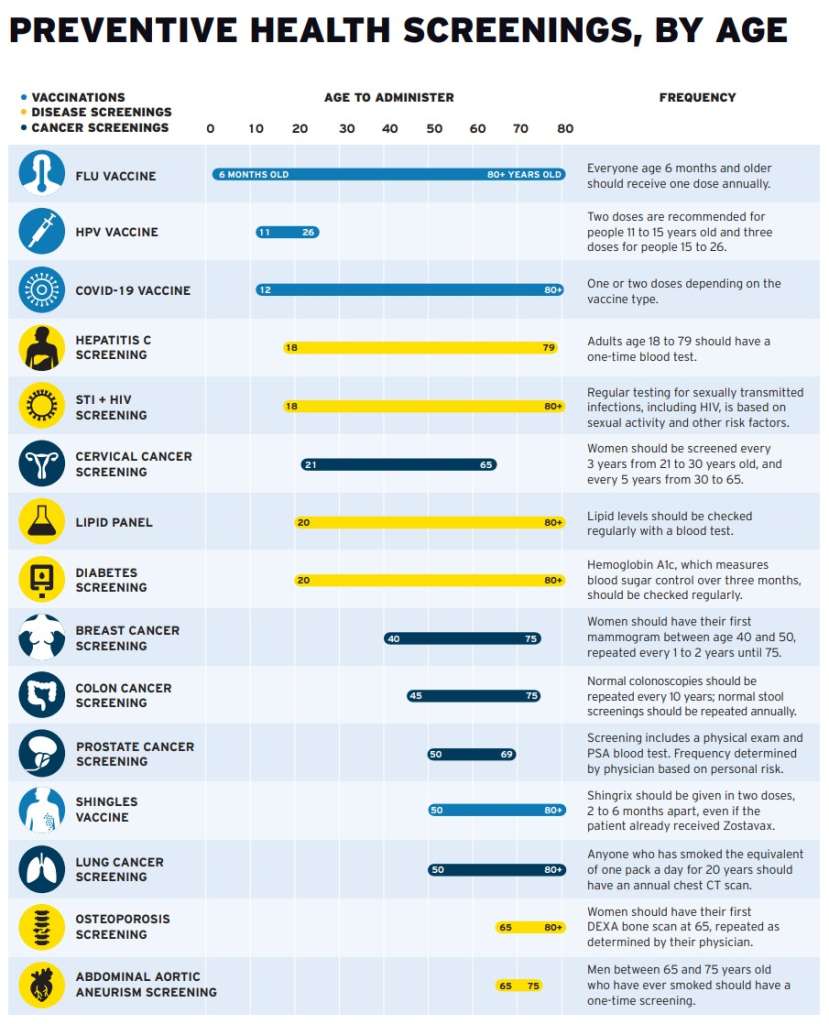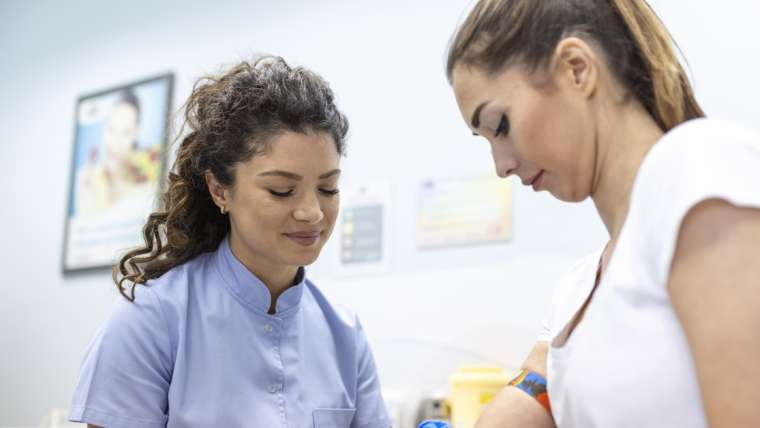
Top 5 Preventive Health Screenings Every Adult Should Have
When it comes to maintaining long-term health, preventive health screenings play a crucial role. They are designed to catch potential health issues early, allowing for better treatment outcomes and, in many cases, preventing serious health problems from developing. Regular screenings can help detect conditions before symptoms appear, so you can take action before it’s too late.
If you want to live a long, healthy life, knowing which screenings you need and when to get them is essential. In this guide, we will cover the top 5 preventive health screenings every adult should have, why they are important, and when you should schedule them based on your age and risk factors. We will also highlight actionable steps to take, helping you make informed decisions about your health.
1. Blood Pressure Screening: The Silent Killer
High blood pressure, also known as hypertension, is a condition that often goes unnoticed because it doesn’t present symptoms. However, if left untreated, it can lead to serious health complications such as heart disease, stroke, and kidney damage.
Why it Works:
Regular blood pressure screenings are essential to detect hypertension early. With early detection, lifestyle changes and medications can be used to keep blood pressure under control, reducing the risk of severe health issues.
When to Schedule:
-
Adults aged 18-39: Screen every 2 years if normal (below 120/80 mm Hg), or more frequently if you have elevated readings or risk factors.
-
Adults aged 40 and older: Annual screenings are recommended.
Actionable Tip:
If your blood pressure is consistently high, it’s important to work with your healthcare provider to create a management plan that may include medication, dietary changes, and increased physical activity.
Authoritative Reference:
The American Heart Association recommends regular blood pressure monitoring for all adults starting at age 18. Visit their website for more information.
2. Cholesterol Screening: Protect Your Heart
Cholesterol is a fatty substance found in your blood that is necessary for building healthy cells. However, too much cholesterol can increase your risk of heart disease and stroke. A cholesterol screening measures your levels of LDL (bad cholesterol), HDL (good cholesterol), total cholesterol, and triglycerides.
Why it Works:
By monitoring your cholesterol levels, you can take action to lower your bad cholesterol and raise your good cholesterol through lifestyle changes, such as diet and exercise. If needed, your doctor may also prescribe medication to help regulate your levels.
When to Schedule:
-
Adults aged 20-39: Screen every 4-6 years if you have no risk factors.
-
Adults aged 40 and older: Screen every 4-6 years, or more frequently if you have risk factors like family history of heart disease or diabetes.
Actionable Tip:
Make heart-healthy choices by incorporating more fruits, vegetables, and whole grains into your diet, and cutting back on saturated fats and trans fats.
Authoritative Reference:
For more information on cholesterol and cardiovascular health, visit the American Heart Association’s Cholesterol Resources.
3. Cancer Screenings: Early Detection Saves Lives
Cancer is one of the leading causes of death worldwide, but early detection can significantly improve the chances of successful treatment. Key cancer screenings include mammograms for breast cancer, Pap smears for cervical cancer, colonoscopies for colorectal cancer, and PSA tests for prostate cancer.
Why it Works:
Screening for various types of cancer can detect the disease in its early stages, when treatment is most effective. These screenings are particularly important if you have a family history of cancer or other risk factors.
When to Schedule:
-
Breast Cancer (Mammogram):
-
Women aged 40-49: Discuss with your doctor when to start screening.
-
Women aged 50-74: Screen every 2 years.
-
-
Cervical Cancer (Pap Smear & HPV Test):
-
Women aged 21-29: Pap smear every 3 years.
-
Women aged 30-65: Pap smear every 3 years or a combination of Pap and HPV test every 5 years.
-
-
Colorectal Cancer (Colonoscopy):
-
Adults aged 45 and older: Begin screening with a colonoscopy every 10 years or more frequently based on risk factors.
-
-
Prostate Cancer (PSA Test):
-
Men aged 50 and older: Discuss with your doctor whether PSA screening is appropriate based on risk factors.
-
Actionable Tip:
Talk to your doctor about your family history and risk factors to determine the most appropriate screening plan for you.
Authoritative Reference:
The American Cancer Society offers in-depth guidelines on cancer screenings. Visit their screening guidelines page for more.
4. Diabetes Screening: Stay Ahead of the Curve
Type 2 diabetes is a chronic condition that affects how your body processes blood sugar. Early detection is key to managing diabetes and preventing complications such as heart disease, nerve damage, and kidney failure.
Why it Works:
Regular screenings allow for early detection of prediabetes or diabetes, which can be managed with lifestyle changes such as diet, exercise, and medication. Managing your blood sugar can prevent serious complications later on.
When to Schedule:
-
Adults aged 35-70 who are overweight or obese: Screen every 3 years.
-
Adults with risk factors: Screen earlier and more frequently.
Actionable Tip:
Exercise regularly and eat a balanced diet rich in whole grains, lean proteins, and healthy fats to manage your blood sugar levels.
Authoritative Reference:
The Centers for Disease Control and Prevention (CDC) provides guidelines and resources on diabetes prevention and management. Visit their diabetes page.
5. Bone Density Screening: Protect Your Bones
As we age, bone density naturally decreases, leading to conditions like osteoporosis, which increases the risk of fractures. A bone density test can help assess your risk and detect osteoporosis before a break occurs.
Why it Works:
Early detection of bone loss allows for preventive measures, such as dietary changes, supplements, and medications, to strengthen bones and reduce fracture risk.
When to Schedule:
-
Women aged 65 and older: Screen every 2 years.
-
Women under 65 with risk factors: Consider screening earlier.
-
Men aged 70 and older: Screen every 2 years, especially if at risk.
Actionable Tip:
Ensure you’re getting enough calcium and vitamin D, either through your diet or supplements, to support bone health.
Authoritative Reference:
The National Osteoporosis Foundation offers more information on bone health. Visit their website at www.nof.org.

Conclusion: Take Charge of Your Health
Preventive health screenings are one of the most powerful tools you have in taking charge of your health. By scheduling regular screenings and staying proactive about your health, you can catch potential issues early and make informed decisions about your care.
Remember, these screenings provide valuable insights! Book a Preventive Screening near Plano, TX today!
Resources:
- American Heart Association – Blood Pressure
- American Cancer Society – Cancer Screening Guidelines
- UCLA’s Preventive Screenings List
- Centers for Disease Control and Prevention – Diabetes
- National Osteoporosis Foundation – Bone Health



